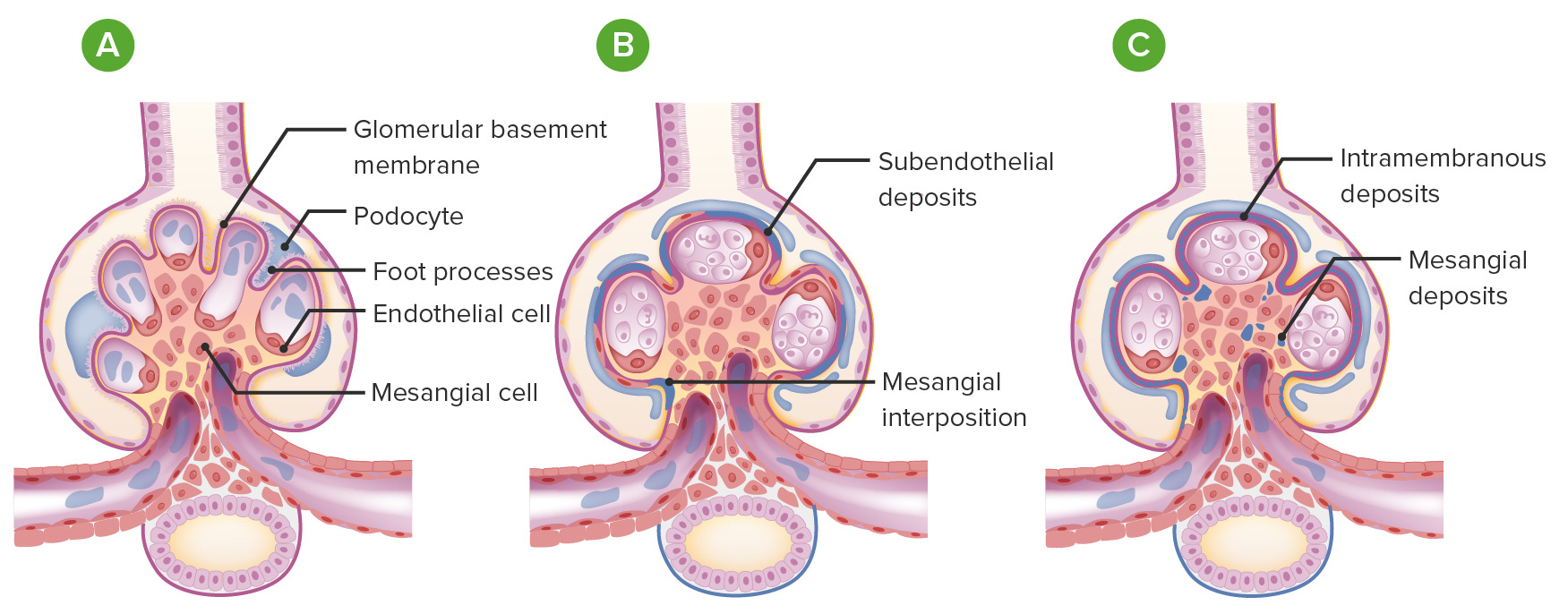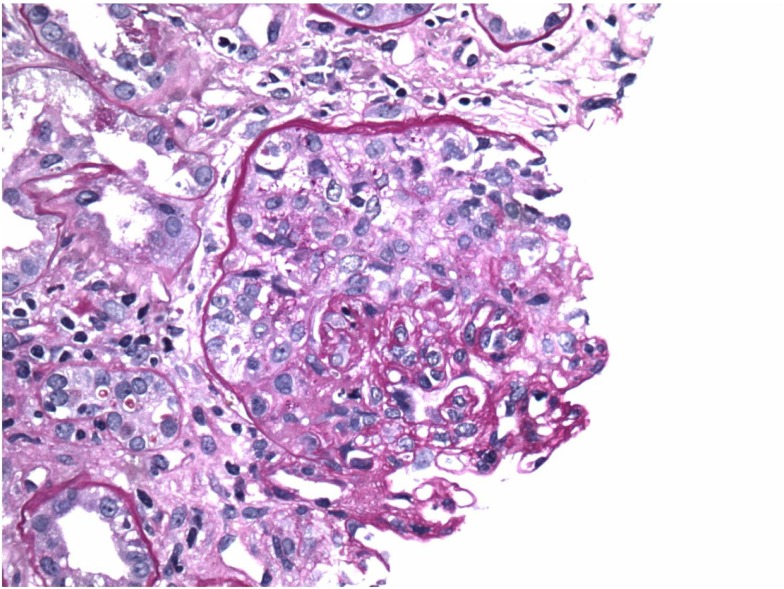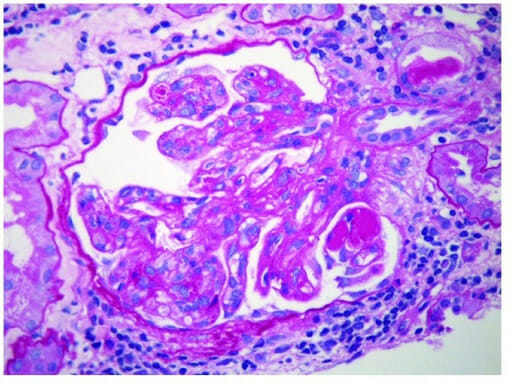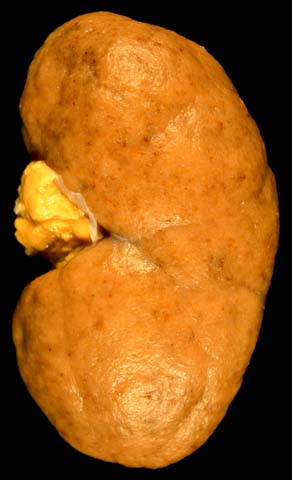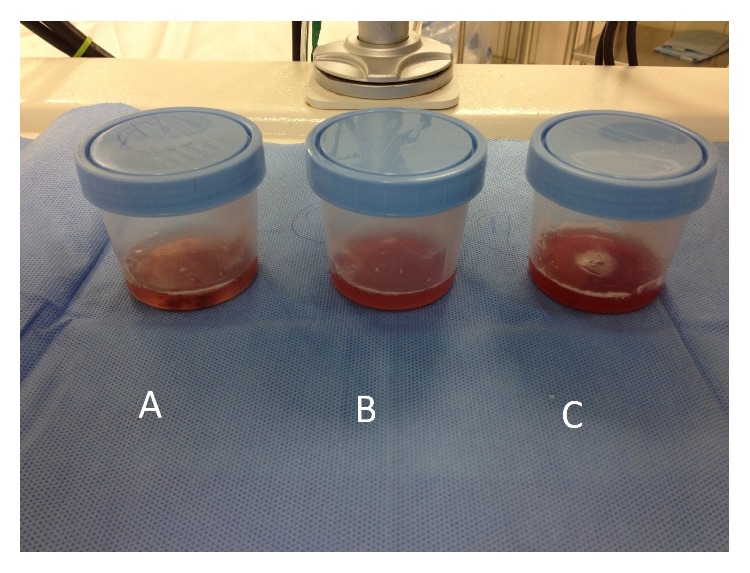Playlist
Show Playlist
Hide Playlist
Mechanisms Producing Glomerular Disease
-
Slides GlomerularDiseaseOverview RenalPathology.pdf
-
Reference List Pathology.pdf
-
Download Lecture Overview
00:01 Type III hypersensitivity immune complexes, examples for this with SLE. 00:06 Now, let’s go into more detail. 00:07 SLE, if it is involving your kidney, how many kidneys do you have? I have talked to you about this earlier just this -- whatever, if it helps you remember. 00:15 If two kidney’s thus you call this double-stranded DNA. Okay, anti-DNA complex but this is an anti-double stranded DNA issue. 00:26 This to you means that it’s SLE induced kidney damage. 00:30 Immunocomplexes, what do they do? They activate the complement system. 00:33 What does that mean? Well, remember antigen-antibody complex, what if you have such a complex taking place with IgM? Now, you tell me as to what kind of complement pathway you were then going to stimulate? Is it alternative? Is it you're going to be classical or is it would be elactin? Antigen antibody complex will in fact be your classical. 00:54 So C5a is produced which is chemotactic, neutrophils damage the glomeruli occurs in nephritic type of glomerulonephritis. 01:02 Nephritic primarily, looking for cytochime, we’ll talk more about this as we go through nephretic and nephrotic. 01:09 That it’s important that you understand with those immune complexes you are then going to stimulate this complement system. 01:15 We will them focus upon that when the time is right. 01:17 Another type of damage here, we’ll talk about Goodpasture, I showed you a linear pattern or should I say I showed you how a linear pattern would be developed in Goodpasture, anti-glomerular basement membrane antibodies. 01:29 T-cell production of cytokines, the cytokines cause glomerular base membrane to lose its negative charge. 01:36 The cytokines damage the podocyte, we put all this together, what would we end up getting? Minimal change disease in nephrotic syndrome. 01:47 Please do not forget the conductor of damage in minimal change disease representing damage to the glomerular basement membrane which losing its negative charge and also fusion of food processes is primarily involved with T-cell production of cytokines.
About the Lecture
The lecture Mechanisms Producing Glomerular Disease by Carlo Raj, MD is from the course Glomerulonephritis.
Included Quiz Questions
Which of the following statements is correct regarding SLE glomerulonephropathy?
- Immune complexes activate the classical pathway of the complement system.
- It shows a linear pattern anti-glomerular basement membrane antibody.
- Anti single-stranded DNA is seen.
- It is type II hypersensitivity.
- C5b is produced, which is chemotactic to lymphocytes.
Which of the following statements is not true about minimal change disease?
- T-cells produce cytokines that lead to a loss of positive charge on the glomerular basement membrane.
- T-cells produce cytokines that lead to a loss of negative charge on the glomerular basement membrane.
- T-cells produce cytokines that lead to a fusion of the podocytes.
- T-cells produce cytokines that lead to a fusion of the visceral epithelial cells.
- The conductor of damage in minimal change disease primarily involves T-cell production.
Customer reviews
5,0 of 5 stars
| 5 Stars |
|
5 |
| 4 Stars |
|
0 |
| 3 Stars |
|
0 |
| 2 Stars |
|
0 |
| 1 Star |
|
0 |

